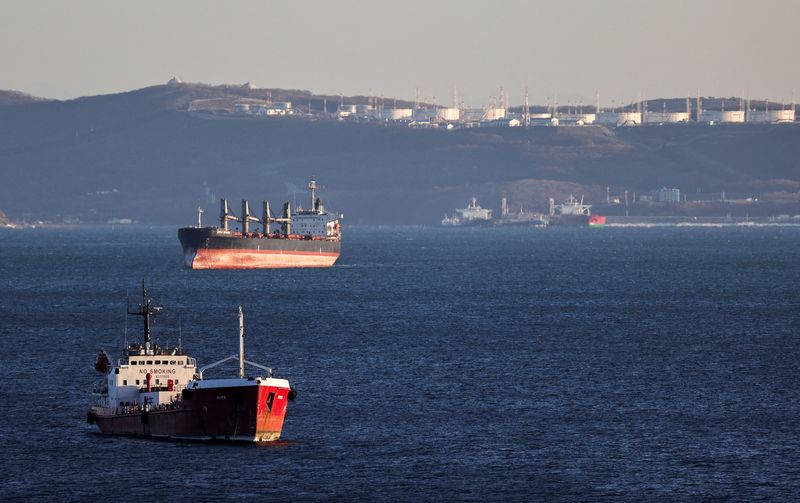MOSCOW/LONDON (Reuters) - Three major Greek shipping firms have stopped transporting Russian oil in recent weeks in order to avoid U.S. sanctions now being imposed on some shipping firms carrying Russian oil, four traders told Reuters and shipping data showed.
The development is a blow to Russia as it narrows the number of shipping firms that are ready to transport Russian oil to consumers in Asia, Turkey, the Middle East, Africa and South America - although traders said Moscow still had enough shipping firms for now.
Greek shippers Minerva Marine, Thenamaris and TMS Tankers have stopped transporting Russia oil in recent weeks, the four traders said.
Thenamaris said it doesn't comment on commercial matters. Minerva Marine and TMS Tankers didn't respond to requests for comment.
All three firms were active shippers of Russian oil and fuels up until September-October when they started scaling down their involvement, according to the traders and data from shipping agents seen by Reuters.
All three companies turned down requests for vessels for Russian crude loading in November and later, said the traders, who previously collaborated with the three firms.
The Greek shippers' exit from the trade followed tighter U.S. sanctions imposed on Russian oil shipments.
In October, Washington imposed the first sanctions on owners of tankers in Turkey and the United Arab Emirates carrying Russian oil above the G7's price cap of $60 a barrel. Last week, it imposed sanctions on three more ships.
The G7 countries introduced a price cap on Russian oil in late 2022, but had not previously enforced it. The price cap allows Western firms to provide shipping and insurance services for Russian crude as long as the oil is sold below $60 per barrel. The cap is designed to limit Russian export revenues.
Russia's main export grade, Urals, has been trading above the $60 per barrel cap since mid-July amid production cuts by the OPEC+ group of oil producing countries, prompting many market watchers to say the price cap wasn't working.
Russia's Pacific ESPO Blend crude oil grade has also traded above the cap, according to U.S. Treasury data.
The three Greek firms had been shipping Russian oil for decades and continued to do so when most other Western companies quit running the routes to avoid rising sanction risks and the imposition of the price cap.
The routes have been lucrative. Russian oil trade has brought record revenues over the past year to the shippers who took the risk and stayed in the business.
Freight rates for Russian oil transportation jumped to as high as $15 million per tanker voyage from Baltic ports to India last winter as shippers charged high rates because of the risk. That was several times more expensive than shipments of non-sanctioned crude.
The three Greek companies operate more than 100 oil tankers capable of handling almost all the oil exports from Russia's European ports of Primorsk, Ust-Luga and Novorossiisk of roughly 10 million tonnes a month or 2.4 million barrels per day.
They also operate a fleet of smaller tankers that transport fuel.
"The dark fleet might not be enough to transport all of Russian oil," one of the traders involved in Russian oil shipping said, referring to the emergence of the so-called "dark fleet" of shippers that move oil from sanctions-hit Russia and Iran and are not covered by Western insurance.
He cited as the main reason the fact that the Russian oil was now travelling 8-10 weeks to reach customers in Asia as opposed to two weeks before sanctions, when oil was sold in Europe. That means more tankers are required for the trade.
However, for now Russia appears to be coping as other shipping companies stepped in, traders said.

Russia is now relying on its shipping company Sovcomflot and a many little-known shipping firms registered in the UAE, India, Hong Kong, Seychelles, Ghana and other locations, according to traders and shipping data.
The vessels carry flags of different states from Liberia to the Cook Islands.